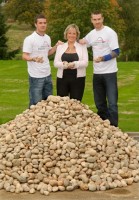Old Firm Support for Cancer Centre
November 6, 2008 by localnews
Filed under Features, Glasgow West, Local News
 Old firm rivals, Celtic and Rangers,have pledged to support a £10million cancer research centre to be built in Bearsden. This will become the largest comprehensive centre of its kind in Scotland.
Old firm rivals, Celtic and Rangers,have pledged to support a £10million cancer research centre to be built in Bearsden. This will become the largest comprehensive centre of its kind in Scotland.
The clubs are supporting the fundraising drive to build the Beatson Translational Research Centre, TRC. This will be the final piece in the creation of the Glasgow Centre for Cancer Research which will study some of the most common cancers to affect people living in this country.
The Beatson Pebble Appeal – to build the centre stone by stone – has been pledged support by the teams led by captains Stephen McManus and Barry Ferguson
The centre is to be built in Garscube Estate and since the summer of 2007, £1.5 million has been raised. A spokesperson said: ‘The centre will convert basic cancer research into real improvements in treatment for patients. The scientists housed there will focus on all types of cancers that affect all ages. Cancers such as breast, prostrate, ovarian, lung, throat, mouth, stomach and intestinal, some of which are the most common in Scotland, will all be studied.’
The University of Glasgow, the Beatson Institute, Cancer Research UK and the Greater Glasgow and Clyde Health Board are jointly developing the Beatson TRC. Construction is due to begin in the middle of 2009 with an expected opening date of summer 2011.
Barry Ferguson, Rangers and Scotland captain said: ‘Cancer affects so many people from all walks of life that anything we can do to tackle it is vitally important.’
Stephen McManus, Celtic captain said: ‘If we work together, we can all help in the fight against cancer.’
Professor Jim Cassidy, head of the University of Glasgow’s Cancer Sciences Division said: ‘The TRC will be the final vital factor in the equation to solving cancer, spanning the journey from the scientists in the lab to the patients in the clinic. It will be a much needed catalyst for accelerating the process of understanding the disease, improving existing therapies and identifying new ones, and bringing them to patients.’
To donate to the appeal, log on to www.beatsonpebbleappeal.org or call 0141 330 3000.


